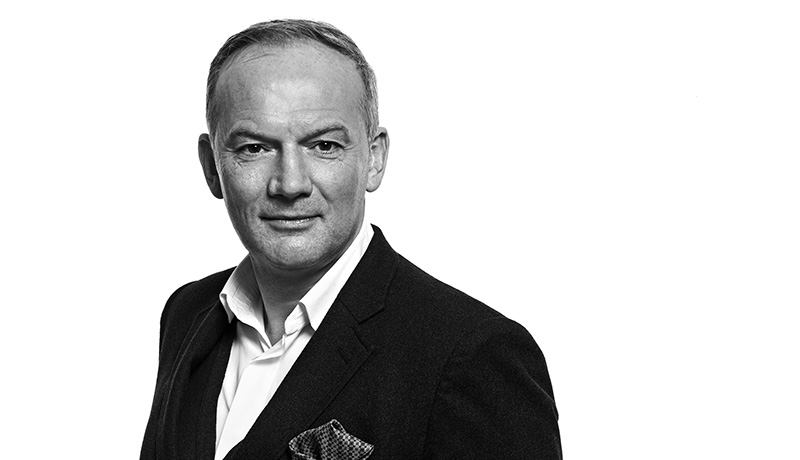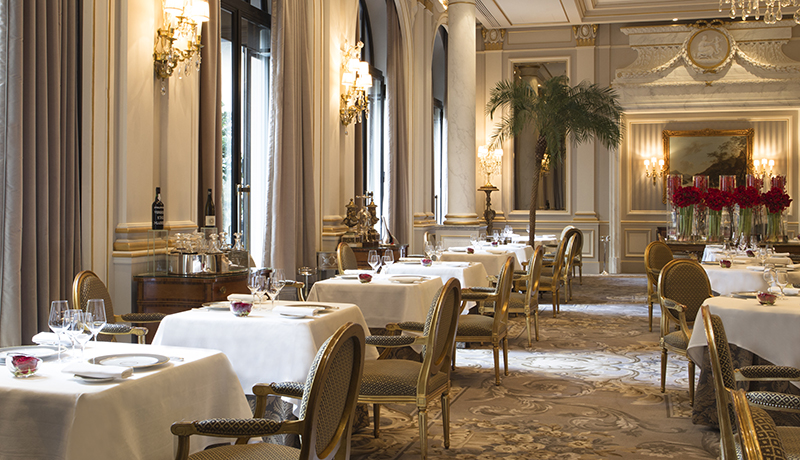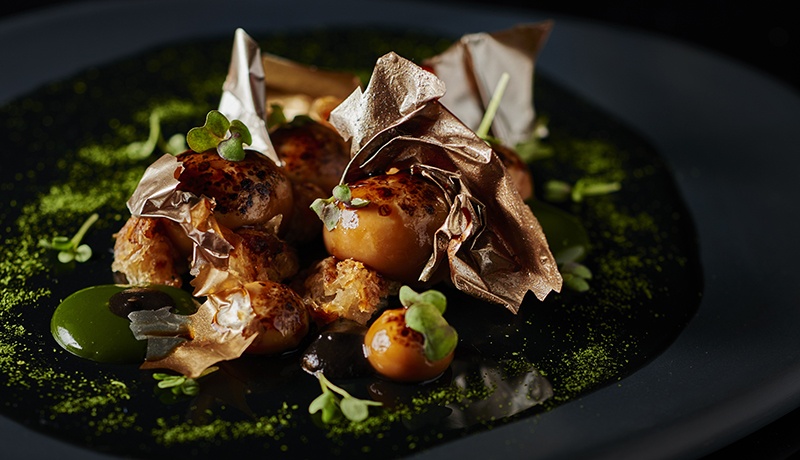

Chef Christian Le Squer
Photo Courtesy of Stephane de Bourgies
A mantel full of awards indicates otherwise, but Christian Le Squer wasn’t always an all-star chef. Le Squer had a relatively slow start, beginning as a kitchen hand on his uncle’s fishing boat in his hometown of Plouhinec in northwest France. After hospitality training school, Le Squer joined the military and, eventually, cooked his way into the high-society kitchens of Paris.
When he was about 20 years old, he landed his first big break in Paris. Three decades later, and many accolades in between, he heads one of the world’s most decadent restaurants: Le Cinq at Forbes Travel Guide Five-Star Four Seasons Hotel George V, Paris.
We recently sat down with Le Squer to reflect on the past 30 years and discuss where things are headed.
How would you describe your culinary philosophy?
I try to let the dishes generate an emotion. It’s not just food. Like a perfumer who tries to find the nose, I try to find the flavors in food and layer them together. To me, a true luxury is to transform simple products into powerful dishes. The most important thing is that it’s French cuisine with French flavors — not international flavors.
Where did you grow up?
It was a very happy childhood. I was living by the sea in a region called Plouhinec, known for its fishing. It’s quite a touristic region.
I remember the scents of the ocean. Smells are very important for me in my food. At the same time, it was an agricultural area where you have a lot of fresh products.
Today when I think back, I feel like I was very grateful to have such fresh food around me all the time. My food is strong on the fish and the seafood, and you can taste this.
How did your childhood shape your approach to cooking?
Having fresh food around all the time developed my palate for food. I have a memory of great flavors.
My father was a woodworker, like carpentry but making furniture. He taught me to be meticulous about my work. And I believe this discipline of being meticulous gave me the technical skills to be a good cook.
What was your first foray into cooking?
When I was young, we took a lot of holidays. My uncle had a boat — he was a fisherman — so my parents would have me spend the summers with my uncle. We would go out into the ocean for 10 days at a time with the men on the ship, and we had one cook.
My job was to assist the cook in the kitchen of the boat, and I loved the convivial atmosphere of everyone having dinner together every day on the ship. It generated my love for food and my passion for sharing, and inspired me to become a cook.
Can you remember the first thing you ever prepared?
I can’t remember. It must have been terrible. I think it was after I went to hospitality school in Brittany that I got really serious. I would work over the weekends during my studies, but it wasn’t fancy food. It was simple.
At that point, I had never heard of these dining guides or stars or anything. My chef told me that if I wanted to become a great cook, then I would have to go to Paris because that’s where the best chefs live and where I could learn.
So did you move?
When I tried looking for jobs, I came from the countryside, so the great restaurants wouldn’t hire me because I wasn’t coming from a pedigreed background. So my first jobs were in small bistros and brasseries.
I joined the military [at] around 20 years old, and while I was in the army, I met other cooks who worked in the great palaces of France.
What did you learn from these chefs?
Keeping in mind I came from the country, these friends told me about the various guides, about the quality of products, about culinary skills. The general population at that time wasn’t aware of these award guides, and it was only the high society who would follow them.
That’s when I decided I wanted to learn high-end cuisine, and I got a job through the referrals of colleagues. That was 30 years ago, and 20 wasn’t so young in the kitchen back then. In France, we start working the kitchen at about 14 or 15 years old.
What was your big break?
I got my first job in Paris at a restaurant that was called La Fermette Marbeuf, where I worked 15 hours a day. So I started outside Paris and worked my way in. I was really determined to see what this high-end food was like.
Then I joined the Le Divellec, a fish restaurant that’s still celebrated today. And then my claim to fame is when I became sous chef at the Ritz Paris.
What happened next?
I left to go work as the chef de cuisine at the InterContinental Paris. I had about 80 employees at that time. I started in ’95 and, in ’96, when I was about 32 years old — that’s when I got my first [Michelin] star. I was trying hard to put all my childhood memories and flavors into the dishes.
My father’s discipline is still apparent in how I executed and balanced the dishes — very carefully.
How do you choose the ingredients you work with?
I love luxury, but I can live without it. I enjoy working with modest products just as much as expensive products like foie gras or caviar.
I feel that fish reflects what people today look for, and we have wonderful shellfish in France so we should celebrate that.
Overall, I try to use the most natural products possible. France has a lot of boutique artisanal producers [who produce] in small quantities, and I try to support them. I feel that chefs have the responsibility to be ambassadors of these individual producers.
Because I have all these flavors from my childhood, I know how and where to source them.
Can you share any of your sourcing secrets with us?
Follow the seasons when sourcing products. In France, we have many seasons, and there’s quite a distance from north to south, so a product could be mature in the south, then you move up to the north as you go. So you will always have the best strawberries if you start from the south and move with the climate.
At this level, it’s a frustration because I’m never fully pleased, and I’m always looking for the product that I don’t have.
Can you tell us about your signature dish — the sea bass with fermented milk and caviar?
It’s the dish that most people come to eat. Basically, I cook the fish and pour the milk on it, creating a coagulation on top. To bring more iodine to the dish, I add on caviar.
The most interesting thing about the dish for most people is the milk. It’s a fermented milk from Brittany that’s a bit acidic and a bit sweet.
In Brittany, the people who would drink that milk would be the poor people. They would just eat that milk cold with hot potatoes to flavor the potato. From a very modest meal, I made it into an upscale Parisian dish.
Which other dishes do people seek out?
Another favorite is the langoustine. In Brittany, you have the langoustine cold with mayonnaise, so it’s inspired by that simple dish. But I wanted to do it hot with warm mayonnaise, and then there’s a little galette crisp made of buckwheat — that’s typically from the north of Brittany. It’s a very elegant, yet strong flavor.
I found a little mill that produces a nice buckwheat flour, because flour actually has a lot of flavor and, sometimes, people don’t realize that.
So what’s next for you?
You should always have goals in life. My dream is to be one day all over the world. I’m the type of individual and cook that whatever I can do for 10 people, I can do for 1,000. I don’t know any other types of businesses, but I know how to transform a recipe to a large scale and have it be just as good. That’s not something most chefs can do. It’s a skill.
How do you keep inventing new dishes?
Every day, I do research and development. My brigade produces new dishes every day to research favors. It’s a discipline that I implemented years ago. As a cook, you need to have passion and put your soul into the food because my strong belief is that when customers come to eat, they can see the passion of the chef in the dish — or they don’t see anything at all.
Le Cinq is a special occasion restaurant for most people. But where do you go for your personal celebrations?
I eat well every day. I’m always researching food, concepts and ideas — that’s work and it’s a bit tiring. So when I celebrate, I want to do something quiet. When I go out to restaurants, it won’t be about me. It will be about my wife, where she wants to go, something that speaks to her or to that moment.
For instance, recently for my daughter’s birthday, we went to La Tour d’Argent, which inspired the Ratatouille movie. I took her there because I know she loves it.


